Sallisaw, Oklahoma: The businesses doing best are the pawnbrokers
Sallisaw has 9,000 inhabitants, a casino, a jail, a private engineering firm and three pawnbrokers. Ted Fine owns the biggest, which is called Fine Pawn and is on Cherokee Street on the way into town. Town is maybe too grand a description but there are a few streets and a collection of buildings and some of them are taller than one storey.
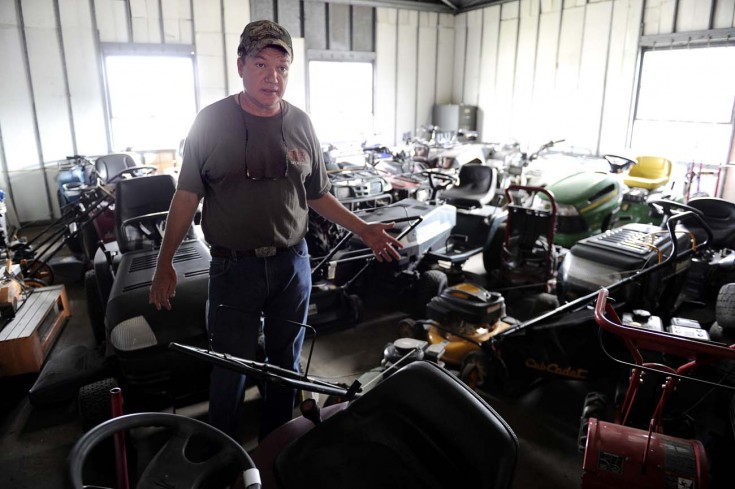
He laughs a lot. Ted is cheerful by nature and it helps that he is born again and was instructed by God to buy the pawnshop when the previous owner retired.
”I’d been fired from a car shop. The pastor in my congregation. I am a Baptist. The pastor advised me to pray for two weeks for guidance. I prayed for three weeks for safety’s sake, heck heck heck! Then I visited the owner of the pawnshop and it was as if he had been waiting for me…”
Ted presents a statement showing that in 2006 the inhabitants of Sallisaw pawned property worth USD 259,982.75. This year they have borrowed USD 449,963 and we have not even reached mid-October.
Do not think that Ted is cynical and happy that his business is going better than ever. Owning a pawnshop that is doing so well is a double-edged feeling.
The store behind the shop has three rooms full of weapons (from small-bore rifles to automatic carbines), guitars, TVs, wheelchairs, trimmers, casting rods, DVD players, microwaves and anything else you might find in a home.
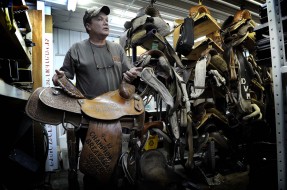
”A horse is not worth 150 dollars these days. It has never been so dry and there is no hay. But a saddle is worth 250.”
Most of the customers are old people who need money for medicine and electricity. The rule of thumb is that they can borrow 30% of the value of the goods. If someone pawns his TV, he might get a hundred dollars. The interest is 20 dollars a month, the annual interest rate 240%, so it is a very expensive way to get money.
”This is the poor man’s bank. Many of my customers don’t even have a normal bank account.”
He takes down an electric guitar. It has hung in the store for two years. It costs 60 dollars to redeem it. The owner has not managed to scrape together the price but every month he pays ten dollars in interest on the loan.
If the customer does not pay, Ted is entitled to sell the goods after three months.
The shop is full of gadgets, from DVD films to chainsaws to powerful revolvers.
More and more of Ted’s customers are unable to redeem their property, so the shop gets fuller. He tries to be nice. If someone calls and says ”I’m getting the money…”, Ted lets the gadgets stay in the store. The customers are Sallisaw citizens. Ted knows many of them. They are his friends and acquaintances and neighbours.
I point to a wheelchair and Ted says that someone who pawns one is sure to have another. Or the owner of the wheelchair has died. A relative has pawned it instead.
On the other side of the street, Ted has a store of cars, pickups, quad bikes, boats, motorcycles and motorised wheelchairs.
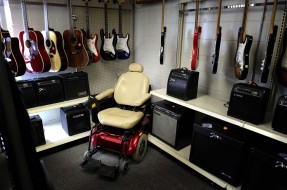
”They get them from the health service and then they come here and pawn them. Heck heck heck heck!”
Many of the customers come back with depressing regularity. But in recent years there has been a constant supply of new ones. We calculate that 20% of the town’s inhabitants have been Ted’s customers at some stage. He has developed a feeling for whether they really intend to collect their gadgets or whether they intend to take the money and run.
”I look in their eyes and try to interpret their faces. But I can’t read people like I used to. Many really do want to collect their things. But they don’t manage it.
Ted points to a compressor that belongs to a carpenter.
”He can’t work without that. ”
He shows tools, tractors, a forklift.
”No one is working. No one! Everything is stationary.”
Ted’s best friend owns the town’s music shop and will be shutting up shop. No one buys a banjo when there is hardly any food on the table. The friend has to leave his house and sell his cars. Ted has employed his wife Peggy in the shop so that the couple definitely have an income.
Ted sits behind a little desk in the shop. Peggy waits for customers behind a counter. There is a sign:
Sorry, no checks. No credit cards. Cash only.
Läs den här sidan på svenska
[slideshow custom=2 auto=”undefined thumbs=”undefined”]
[socialButtons]

 Peter Kadhammar och Urban Andersson reser i två veckor över den amerikanska kontinenten. De ska skildra den amerikanska krisen som kan vara slutet på en historisk epok, det amerikanska århundrandet.
Peter Kadhammar och Urban Andersson reser i två veckor över den amerikanska kontinenten. De ska skildra den amerikanska krisen som kan vara slutet på en historisk epok, det amerikanska århundrandet.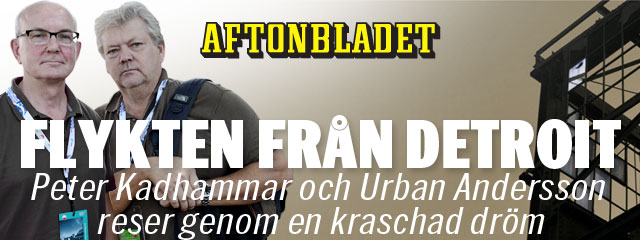
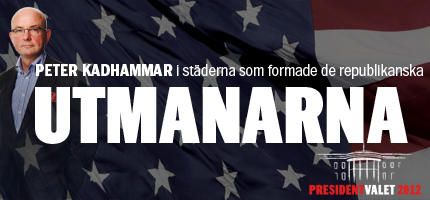


 RSS-flöde
RSS-flöde